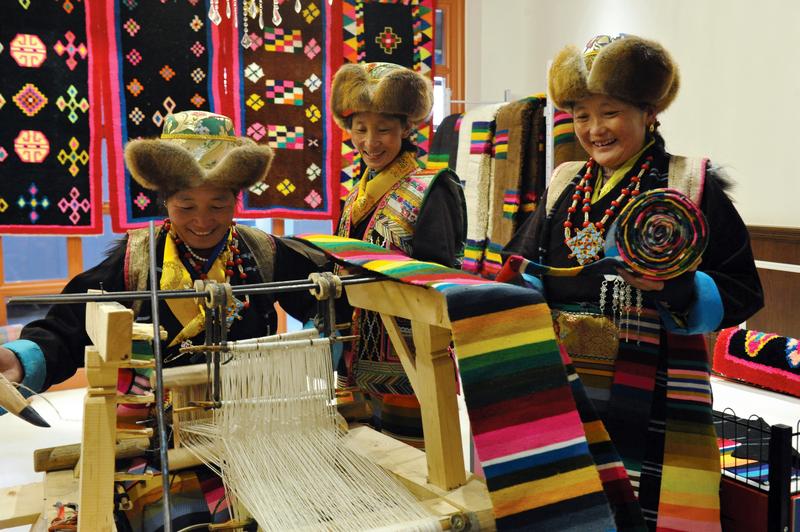 Artisans in traditional clothing showcase Tibetan carpet-weaving techniques at an expo in Lhasa. (ZHAO LANG / CHINA NEWS SERVICE)
Artisans in traditional clothing showcase Tibetan carpet-weaving techniques at an expo in Lhasa. (ZHAO LANG / CHINA NEWS SERVICE)
LHASA-Migmar Tsering could have opted to retire years ago, but he chose to stick around instead as his Tibetan carpet workshop needed seasoned artisans like him.
The 63-year-old skillful carpet maker is deeply in love with his work and has been engaged in this craft for the past 47 years at the Gyalze Carpet Factory in Shigatse city, Southwest China's Tibet autonomous region.
Gyalze county is famed for its quality and exquisite Tibetan carpets, with weaving techniques dating back over 900 years.
Generations of artisans cherish the traditional craft and have carried forward the legacy, with many aspiring to tap even bigger markets at home and abroad by powering carpet making through innovation.
"Look! The dragon, phoenix and coral trees on this carpet augur a happy marriage, material prosperity and good fortune," Migmar says, adding that locals favor such traditional patterns, while bold designs can be adopted for customers from outside the region.
Thanks to Migmar's magical hands, the initially weaved carpets can be revamped into all kinds of three-dimensional creations of art using a simple pair of scissors.
Established in 1973, the workshop was listed among the first batch of demonstration bases for the protection of national intangible cultural heritage by the central government in 2011.
The cultural department of Tibet earmarked 6.5 million yuan ($1 million) in 2017 from an intangible cultural heritage protection fund for the construction of two modern buildings of the factory, says Lhaphun, manager of the carpet workshop.
"Our workshop currently boasts 60 skilled workers and complete sets of equipment, and sees orders flooding in. Our products are marketed both at home and abroad," he adds.
Compared with Lhaphun and Migmar, 30-year-old Tenzin Trinley is a latecomer in the carpet business, but he is just as dedicated, if not more.
Tenzin, who also hails from Gyalze, gave up a stable job in 2014 to set up a carpet factory. "I love this occupation and want to spread its glory."
He has set his sight on innovation and caters to more modern tastes. "We are capable of making carpets with lifelike wedding photos on them using our traditional skills," Tenzin says.
Last year, the factory's sales revenue topped 7 million yuan, thanks to its product and technical innovations, as well as the efforts to diversify sales channels.
Tenzin's endeavors in this field have helped create many jobs for the locals. Earlier this year, he was awarded for his outstanding contribution to the country's poverty alleviation campaign.
"To achieve better development, we must continue our innovation and keep up with the times," says Tenzin.
Even after so many decades, Migmar continues to work with similar passion, arriving early at his factory.
"Carpet trimming is more than just a job for me," he says. "I really hope that our work can be cherished and treasured by more and more people far beyond our region."


